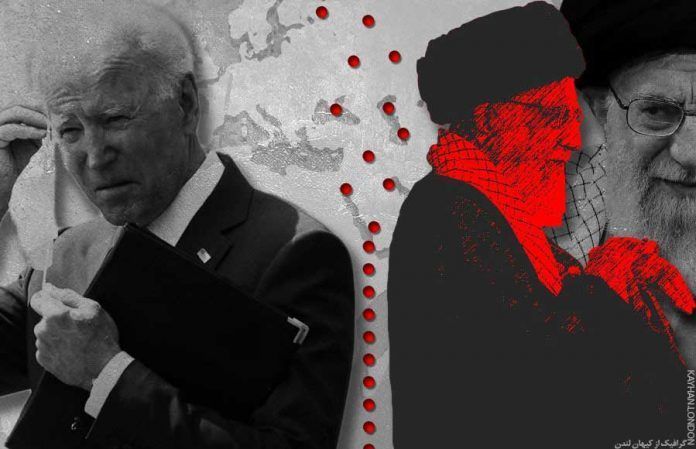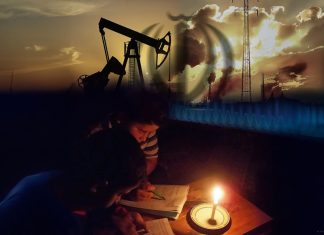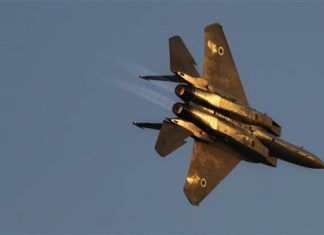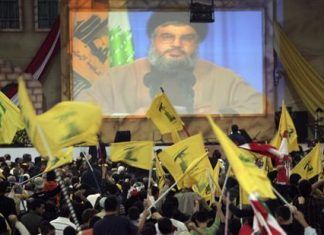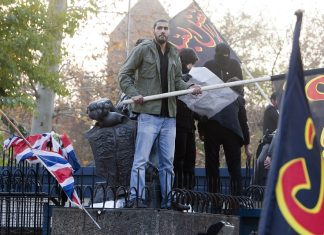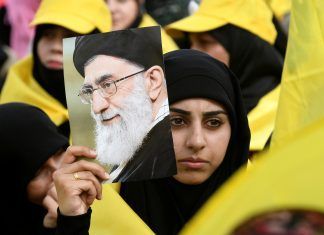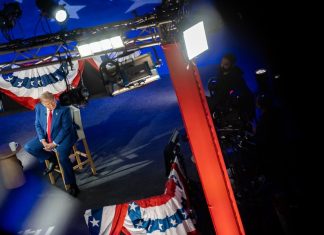By Ahmad Rafat
The inauguration of Ebrahim Raisi as Iran’s new president this month coincides with ongoing Vienna talks on rebooting the 2015 Joint Comprehensive Plan of Action (JCPOA), better known as the Iran nuclear deal. Yet the talks have reportedly reached a dead end.
The Islamic Republic is aiming to raise the stakes in the nuclear negotiations with the West and the U.S. by escalating its regional adventurism, including terrorist operations in the Persian Gulf and the Sea of Oman, Hezbollah rocket attacks on Israel, and support for political crises in Iraq and Lebanon.
Hezbollah Chief Nasrallah Said Group Could Escalate Response to Israel
By prolonging the nuclear talks, Tehran aims to increase the cost and the risks for Europe and the U.S. to sign off on a new nuclear agreement. The Islamic Republic wants to minimize the other parties’ demands if it cannot get what it wants from any new negotiations.
While there are only a few unresolved issues between Iran and the U.S., they are very significant. U.S. President Joe Biden and his administration cannot comply with Iran’s two chief demands. U.S. representatives to the Vienna talks have repeatedly said that they could not guarantee that a future president would uphold the JCPOA because no U.S. president could give such assurances.
Sanctions are also a significant obstacle to the negotiations. The White House cannot and does not want to lift those sanctions that have been imposed on Iran because of its human rights record and terrorist activities.
Mr. Raisi was dubbed a “death judge” for his role in a panel that became known as the “Death Committee” and presided over secret tribunals that sentenced thousands of political prisoners to death in 1988.
EXCLUSIVE – U.N. Expert Backs Probe into Iran’s 1988 Killings, Raisi’s Role
He is taking office at a time when tensions in the Middle East, the Persian Gulf, and the Sea of Oman have escalated to a critical level.
An unmanned aerial vehicle (UAV) attacked a merchant oil tanker, MC Mercer Street, in the Sea of Oman on July 29 and 30, killing a British national and a Romanian citizen on board.
London-based Zodiac Maritime, owned by Israeli shipping magnate Eyal Ofer, manages Japanese-owned MC Mercer Street — which sails under the Liberian flag.
The U.S. and Britain have blamed Iran for the drone attack. Every country with a vested interest in the tanker except Japan has filed a complaint against the Islamic Republic.
In another incident on Aug. 2, nine armed men hijacked MV Asphalt Princess, a bitumen tanker near the port of Fujairah in the United Arab Emirates (UAE). Although it was not clear who seized the vessel, many security experts suspect Iran was behind the hijacking.
A Dubai-based company owns the MV Asphalt Princess. The hijackers abandoned the ship two days later off the coast of the UAE.
The U.N. Security Council held a closed-door session on Aug. 6 to discuss the attack on MC Mercer Street.
Meanwhile, foreign ministers of the G7 (Canada, France, Germany, Italy, Japan, the U.K., and the U.S.), member states of NATO, and many Western countries condemned the action, claiming that Iran was behind the drone attack.
Iran has denied carrying out the deadly attack.
Israel has accused the Islamic Revolutionary Guards Corps (IRGC) of being behind it. It even named Hamid Aghajani, the IRGC commander in charge of the Raad (Thunder) UAV Battalion, as being responsible for the drone attack on the oil tanker.
The IRGC Qods Aeronautics Industries design and manufacture the Raad UAVs.
Mr. Aghajani has also been linked to the drone attacks in 2019 on the state-owned Saudi Aramco oil processing facilities in eastern Saudi Arabia.
Israeli Defense Minister Benny Gantz has identified Aghajani as the principal commander for masterminding, planning, and facilitating IRGC “terrorist operations” in the region.
Among the 500 U.S. sanctions against Iran, two hold particular importance for Tehran, namely those imposed on the senior leadership for violating human rights, and the designation of the IRGC as a terrorist organization. Having those sanctions lifted is a matter of pride for the Islamic Republic.
Tehran views some demands by the U.S. in the Vienna talks as its red line.
Iran’s Supreme Leader Ayatollah Ali Khamenei reiterated those red lines during President Raisi’s inauguration ceremonies.
“Americans maintain their contradictory stance but have taken no steps,” Mr. Khamenei said. “They agree on paper and promise to lift all sanctions but have not and will not do it. Americans set conditions, saying that to lift the sanctions, we must insert a sentence in the agreement at this exact moment, which means they will discuss the issue with us at a future time. They would not agree to anything unless we insert that specific sentence.”
“The sentence gives them an excuse to interfere in other matters, including the JCPOA, its renewal, the missile [program], and regional issues,” Khamenei added. “So, they can cancel the agreement at any point by accusing us of violating the accord should our state policies or the Majlis [Iranian Parliament] exclude some issues from the talks.”
[aesop_image img=”https://kayhanlife.com/wp-content/uploads/2021/03/2021-02-10T114757Z_31465754_RC2NPL9UA3BQ_RTRMADP_3_IRAN-ANNIVERSARY-USA-scaled.jpg” panorama=”off” credit=”FILE PHOTO: Iranian women hold pictures of the Ali Khamenei and Qassem Soleimani, during the celebration of the 42nd anniversary of the Islamic Revolution in Tehran, Iran. REUTERS./ ” align=”center” lightbox=”on” captionsrc=”custom” captionposition=”left” revealfx=”off” overlay_revealfx=”off”]
Mr. Khamenei could show more “heroic flexibility” and back down, given the political climate in the country and the economic crisis resulting from stringent sanctions. However, he plans to pressure the U.S. to back down from its demands for the time being.
Some people in the current U.S. government have concluded that the JCPOA cannot stop Iran from securing nuclear weapons, and that the parties must therefore sign a new agreement. While the original nuclear deal signed in 2015 was due for renewal by 2030, Iran’s ballistic missile program restrictions will be lifted in two years.
The U.S. is justifiably concerned about the JCPOA, given that it did not prevent Iran from continuing its secret nuclear program even before the U.S. pulled out of the agreement in May 2018.
Some media outlets have reported that if the Vienna talks were to fail, President Biden might impose fresh sanctions on Iranian oil imports to increase pressure on the regime. The reports, however, could be part of a plan to increase “psychological pressure” on the newly sworn-in Iranian President Ebrahim Raisi, who has promised to solve the country’s economic crisis.
If approved, the new U.S. sanctions will target Iran’s oil exports to China, which, according to TankerTrakers.com, amounts to some 1 million barrels a day. Other sources put the figure at 1.5 million barrels a day. According to the Reuters and Bloomberg News agencies, parts of Iranian oil destined for China go through Iraq, Malaysia, and Oman.
While many European governments continue to condemn actions by the Islamic Republic, Joseph Borrel, the High Representative of the European Union for Foreign Affairs and Security Policy, seems to have adopted a different policy towards Tehran.
The presence of three senior EU officials, including Mr. Borrel’s Chief of Staff Enrique Mora, at Raisi’s inauguration ceremony has raised eyebrows. Mr. Mora, the EU chief negotiator at the Vienna talks, was seated directly behind senior leaders of the Palestinian Hamas, the Lebanese Hezbollah, Yemen’s Houthi rebels, and the Iraqi Popular Mobilization Forces (PMF). Many European political parties have criticized Mora for attending the event.
Negotiations in Vienna have reached a dead end because tensions in the Persian Gulf and the Sea of Oman have escalated to a critical level after the recent drone attacks on MC Mercer Street and the hijacking of MV Asphalt Princess. Meanwhile, Israel is reportedly preparing to take military actions against the Islamic Republic, ending the Vienna talks abruptly.
Israeli Defense Minister Benny Gantz said his country was ready to attack Iran, and it was time to respond to the Islamic Republic’s actions. Speaking to a local TV station, Mr. Gantz said: “Iranian regime knows we can carry out an operation on its soil.”
“A final confrontation will ultimately happen with Iran,” Gantz added.
Israeli Prime Minister Naftali Bennett recently tweeted: “The time for sitting relaxed in Tehran and setting the Middle East on fire is over.”
During a visit to the Israeli-Lebanon border, Mr. Bennett said: “We are trying to unify the globe to respond to Iran’s adventurism, but we can go it alone.”
A proxy war already started on the Israeli-Lebanon border after Hezbollah fired 19 rockets into Israel. Israel responded quickly with its fighter jets bombing southern Lebanon.
Israel Names President’s Brother as U.S. Envoy, Points to Iran Experience

